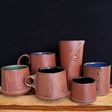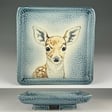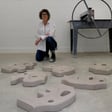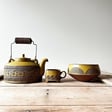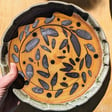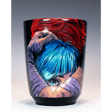The Obsession with Pottery
00:00:00
Speaker
I really started putting positive quotes on my work as a way to... What keeps you motivated to keep making pottery? It's an obsession. I think it's always, you know... Why do you think you have a hard time stopping
00:00:15
Speaker
It is hard to stop. I just keep adding more and more and more and more. What is something you wish you knew before becoming a full-time potter? Something I wish I knew before becoming a full-time potter. What advice would you give to someone who discovers their own unique voice? Take all the inspiration from all these different artists.
Finding Artistic Voice and Mentorship
00:00:36
Speaker
Julianne, welcome to Share Your Pottery and share with me what is something that has helped you the most along your pottery journey so far?
00:00:42
Speaker
What has helped me the most? I would say probably having some amazing mentors. And the other would be the internet. I mean, it's an amazing tool that we've all been able to use and show our work. Two, two big things. I didn't have the internet when I first started doing clay. So it's been fun. Absolutely love
The Accidental Start in Pottery
00:01:05
Speaker
it. So tell me the story, how you got started making pottery.
00:01:09
Speaker
Well, probably like a lot of people, but I sort of fell into it. I have a degree, a business degree in international marketing and I speak a couple languages. And my senior year of college, I failed my first class and it was in, I believe statistics. It was a sequential class for something else. And I only had two classes left at the end to finish my degree. And so to kill time, I took my first pottery class.
00:01:39
Speaker
And it's kind of, you know, you get your hands in it and something magical happens and it's all done. So kind of how I started doing clay. How long ago was that? So that was 1989, my senior year of college. So you've been making pottery for a little over 30 years now. Yes.
Healing and Connection through Pottery Quotes
00:02:06
Speaker
What keeps you motivated to keep making pottery?
00:02:09
Speaker
It's an obsession. I think it's always, you know, making something new, making something more exciting. I really think in talking to my other clay friends, it's a bit of an obsession, Clay. It's hard to, you get kind of anxious when you haven't done it in a few days. Absolutely great. I love that. So, so you contribute growth as an artist to getting into force and putting positive messages onto your pots. Can you tell me more about this?
00:02:39
Speaker
So, you know, I really started putting positive quotes on my work as a way for self-healing and putting positivity out into the world has really resonated with a lot of people. And I've actually had customers saying, Oh, you know, they come up and they find a mug. They're like, I'm going through a divorce or something horrible. And that's why they buy my work often.
00:03:05
Speaker
I love that. Shaping Nation, you could turn your pain, you could turn your struggles, your trauma, and you could turn that into art and you could put a spin on it and make it so you're healing yourself through your art. I love that. Yeah. So now, how did your work start to change from this experience when you started adding new positive quotes to your work?
00:03:28
Speaker
Well, you know, I, it's, how did I work? How did this change? You know, I think, you know, karma, karma is good or bad and putting the, you know, the good out into the world and positivity out into the world. It starts flowing. The good starts blowing back and it's just giving me more.
00:03:50
Speaker
of a reason to continue with doing, doing my work. So, you know, I always kind of say it's, you know, I'm sending out one mug into the world. What do I say? Let me go back a second there. Quote is sending love and life and positivity out into the world, one mug at a time. I absolutely love that.
00:04:15
Speaker
So now, what were you feeling when you started putting these positive quotes onto your pottery? Yeah. What was I feeling? I had so much frustration going on in my life and...
00:04:30
Speaker
I was really negative about my work and I was just, that was what I was feeling. I just needed a way to put something else out good and instead of negatives, you know, you have all these negative feelings and I just didn't want negative negativity coming at me anymore. So that's kind of what I was feeling. It was brushed out of frustration that I started doing it.
00:04:55
Speaker
Absolutely love that.
Inspiration from Carnivals and Theater
00:04:57
Speaker
So let's talk about your pottery. You're inspired by carnivals, circuses, and old theaters. Tell me more about this. Well, it's kind of like it's all the magic behind it in the theater. It's all the glit, it's all the glam, kind of dirty underbelly of a circus. And I've really always had some weird, you know,
00:05:24
Speaker
weird, what's the word, gravitation towards that. It's like the old Baroque and Gaudí, the artist, the architect being over the top and Gaudí actually, I liked it. It's a little bit of my maximalist personality in that. You mentioned this maximalist personality. Tell me more about that.
00:05:49
Speaker
You know, it kind of shows up in my work. I have a hard time knowing when to stop, knowing when to stop adding more details, more color. My work takes a long time because I keep adding all these little appliqués on it. More recently, I've been using high temperature wire and adding little dangly things or spinny things.
00:06:17
Speaker
That's also why people have been resonating with my work. It's very tactile and fun. Why do you think you have a hard time stopping and how does this actually impact the way you make your own pottery? If it didn't take me so long, it would be better. I do spend a lot of time, you know, adding all the details, but I think that's what makes it a little, sets it apart a little bit from other people's work.
00:06:45
Speaker
It's it's it is hard to stop. I just keep adding more and more and more and more. But I kind of like it. I like I like doing I love my job. I love what I make. I love what I do. I love that shaping nation. Sometimes the best thing that you could do is just to focus and take a little bit longer on each piece to make the best possible work that you can possibly make for yourself. I love that.
Childhood Influences on Artistic Style
00:07:10
Speaker
So on your website, you have two pictures of art that you made when you were five years old. Tell me a story about why you decided to put these pictures onto your website. Well, they're probably the only two childhood pieces of art that I have. And I think I found my voice kind of young. I mean, I made those a summer before kindergarten.
00:07:34
Speaker
that little mug, which again, it's got a peace sign on it. It's got the affinity symbol on it. And it kind of looks a little bit like what I still do to this day. And then of course, it's just always had, I don't know, it's like almost like the old book, the Guinness Book of World Record, just kind of this weird affinity towards it.
00:08:00
Speaker
When was the moment you kind of put two and two together that you're kind of making the work that you made in the past were kind of coming back into work that you make today? When was the moment? You know, I had a lot of great mentors and instructors over the years, and you're learning all these different techniques, you're learning
00:08:21
Speaker
you know throwing and my work for a long time was very earth earthy and because those are the glazes that existed in the clay studio where that you're doing content high fire was all earth tones and whatnot and I didn't really start adding color back into my work maybe gosh
00:08:44
Speaker
Over the past 10 years, but really in the last six years, have I gone over top with color. And it's starting to look like that childhood artwork that I used to do, I think. Why do you like adding so much color and brightness to your pottery?
Embracing Color and Personal Style in Pottery
00:09:00
Speaker
I don't know. It's fun. It's different. It sets my work apart from other people's work. Yes, there are a lot of colorful
00:09:09
Speaker
potters, but I think been able to have found my voice a little bit and I just I enjoy it. What advice would you give to someone that is also wants to start adding more color into their own pottery? What advice would I give? Well, first, I think you need to make what you love. Don't listen to other people saying, oh, you should make this. You should make that. But make what you love. Make it for yourself.
00:09:38
Speaker
And then I think it starts resonating with more people because you're presenting something that you love, not just to make it, to make it, to sell whatever might be the most popular thing to make an art show or whatnot, but make what you love. And I love color and I also appreciate
00:10:02
Speaker
other artists' works that isn't so colorful, but I tend to gravitate towards colorful art. Absolutely love that. Shaping Nation, the most important thing is to make what you love. And whatever that may be, if you like color, add those colors to it. If you don't like color, tricep the gouse. I absolutely love that.
00:10:23
Speaker
So now something else I found interesting is you said my aim is to elevate everyday objects to make the ordinary just a little more extraordinary. Tell me more about this. Well, it kind of goes back to.
00:10:37
Speaker
don't have the ability to just do a plain piece. It just has to have a little bit more extra pizzazz going on. But that's basically kind of it. It could be just a plain mug, just a little bit more exciting and
Transforming Everyday Objects
00:10:55
Speaker
fun. And I even started making little spinner thumb rests that spin playful. Thumb rest that spin?
00:11:07
Speaker
How does that work? I can send you a picture. Yeah, I've been playing with the kind of the fidget spinners and whatnot on my pizzas. Do you just use like high temperature wire on the handle and like kind of like a top almost? Kind of goes this this way. So it's actually like a spinning bead. Oh, yeah. Temperature high temperature wire kind of holding it.
00:11:34
Speaker
Like the bead is here. Does that make sense? But so spinning bead on the, on the handles. And then I have little dangly things kind of like earrings on the bottom of the handles and having fun with. I absolutely love that. I'm excited to see where that takes you. So can you briefly walk me through how you create one of your amazing bright colored pots?
00:11:59
Speaker
Well, I started out as a thrower for many, many years and actually only switched over to hand building maybe in the last eight years or so. I have a neurological issue that makes me a little dizzy. And the thought of looking at a pottery wheel, I had to pivot. And so I've been doing mostly slab built work. I make my own, all of my own stamps and I'm kind of unique in that I make my stamps out of wire where
00:12:30
Speaker
You know, a lot of people make them out of bisque, which I do as well. But it's flab work for the most part, which I'm really slower. It's more methodical. I do things kind of in assembly lines. So I have a bunch of cylinders that are spammed and then I did the bottoms. And so I do it kind of in assembly line and keep things in a damp box while I'm working.
00:12:58
Speaker
So you mentioned that you switched from wheel throwing to slab building. Were there any obstacles in your way when you made that switch?
00:13:08
Speaker
I had to teach myself a little bit about hand building and that was a process. It took a little while, but I very much enjoy it. It's a completely different animal compared to throwing. I do miss throwing and I'm hoping to get back into it so that I can incorporate a little bit of what I'm doing now in thrown pieces because I can get bigger, faster, larger pieces quicker than I can hand building. Absolutely love that.
Journey to Full-Time Potter
00:13:37
Speaker
Let's talk about the business side of pottery. Can you tell me about the moment when you decided to become a full-time potter?
00:13:44
Speaker
Well, I was going to college in San Francisco for ceramics after I had my degree in business. And I was lucky enough that my brother offered me the opportunity to move back to Michigan and open up a paint-it-yourself studio, thinking that I could do my pottery with this studio that became incredibly busy and wasn't able to do pottery that much.
00:14:11
Speaker
I stupidly thought I could have my wheel in the studio, and then I became the birthday party central. But I was able to sell that studio that morphed into a clay studio, which morphed into a clay studio with an art gallery, eventually sold, and I was out doing clay for a little while.
00:14:36
Speaker
And all I had was like my kitchen table for a long time. And I had, I had a not very supportive partner. And I just said, I need to, I need to be doing what I love to do. So I've been doing clay side gig after I sold the gallery.
00:14:58
Speaker
for maybe 15 years. And just in 2019, I just jumped ship. I was like, all right, we're doing clay full-time. And doing clay ever since. And actually, arriving. I'm able to pay my bills and I wish I had done it sooner. So why didn't you do it sooner? What was holding you back? Yeah, the ex-husband. He was holding me back.
00:15:26
Speaker
But that's over. And, you know, again, taking a positive spin and things are looking up. And I've been able to do my own thing, which is fantastic. Absolutely love it. What were you feeling when you became a full-time potter? Was I feeling it? It was a really exciting experience. I enjoyed, you know,
00:15:52
Speaker
It's somewhat solitary. We live in our little basement studios and you don't see many people. And the internet was kind of a fun way for me to start showing my work and making friends. And I kind of live in, after the divorce, I moved way up to Northern Michigan where my parents are. So it's a bit isolating up here. So I was excited when I started doing my own pottery. I was able to
00:16:17
Speaker
share with with that through the internet and that's kind of how you found me so it's been fun so so now you don't have to answer if you don't want to but i'm just curious how much did you sell the your gallery and your studio for oh sad i don't remember the exact amount i sold it for it wasn't that much it was under for like 40,000 but i didn't own the building
00:16:44
Speaker
So she just took over my lead. And this was in 2008 when the economy was taking a nosedive. And I sold it to her, went under land contract, and they went out of business early. So I got everything back. And then I sold everything. I had 10 wheel. I sold everything that I had.
00:17:12
Speaker
It was a Kyle and I moved back, I moved back out west at that time and she was in Michigan. So I said, oh, sell it all and started, started new. I think it was somewhere around 40 that I sold it for because I had a good name and a good reputation. And that's what you're buying a lot, a lot of times from a business. Would you ever try doing another pottery studio like in the future? No, I really enjoy.
00:17:43
Speaker
doing my own thing. I have been doing a lot of workshops where people will bring me out. And that gives me the opportunity to teach a class here and there, but I'm not trapped in my studio. I felt like we, ours that you're hoping and you're a new business, you really can't afford to have a lot of help. So you're there.
00:18:04
Speaker
a lot and I was open like 10 am till 9 pm every day because it's open studio for you know but I also had an art gallery there so I didn't want to give people just the key to get in or you know code because there was there's art there you were responsible for other people's artwork and I sold different mediums as well. It was all Michigan artists basically at that time.
00:18:29
Speaker
So I don't think I'd do it again and definitely not do a paint it yourself again. That was 13 birthday parties a week. Well, it's enough. It's a good lesson. I love that. Now, what is up to you wishing you before becoming a full-time potter? Something I wish I knew before becoming a full-time potter. Well, I wish I did it earlier.
00:18:56
Speaker
I wish I had not listened to other people. That's what I would have done. I wish I had done it earlier. It's been a great experience. I think a little bit about that one. We can always edit this part, I guess. But that's the big one. I wish I had done it, just done it earlier and followed my heart.
00:19:18
Speaker
I love that. ShapeNation, if you are on the cusp of maybe trying to go full time, you might want to just get started because you're probably going to regret doing it too late, but you're not going to regret doing it earlier. I love that. So what seems to work well for you that helps you to be able to sell your pottery and continue being a full time potter?
Leveraging Social Media for Pottery Sales
00:19:43
Speaker
what works well for me, Instagram, Facebook, just putting myself out there, doing the little reels and things. It's really, you know, it's gained a bit of a following, which is exciting, but I think that's how I've been able to get my work noticed.
00:20:04
Speaker
And I don't really do art shows. I pretty much sell pretty much online. And then of course, if I do a workshop, I take work to sell at the workshop. And then I've been doing a few like specialty gallery things where they invited me to do something and like I'm doing one coming up and it's all about drinkware. So I'm just doing a few of those kinds of things.
00:20:29
Speaker
absolutely love it. Now, what advice would you give to someone that is looking to have success selling their own pottery? Well, make what you love. First and foremost, make it for yourself and no one else. And when you're excited about your work, it shows in your enthusiasm and people are often, they're buying something because they like you, not necessarily, they like your
00:20:59
Speaker
But you're putting yourself out there. You're putting the love into your work out there. And it's kind of sort of happening. Absolutely agree. Some excellent advice right there. Shape Nation, make what you love and put yourself out there. Absolutely love it.
Validation through Teaching and Demonstration
00:21:15
Speaker
So let's talk about discovering your voice. Can you tell me about the moment when you knew you were heading in the right direction with your pottery? When I knew I was heading in the right direction with my pottery, I think it's when I started
00:21:30
Speaker
getting invited to talk or demonstrate. The very first one was Clay Con West as a convention. And I'm like, someone wants to see me. Someone wants me to demonstrate. And then I've been invited to teach. People were like, hey, we'll fly you out somewhere to teach. And that was exciting and felt like, well, maybe someone does want to see my work. What were you feeling during this moment? Was that feeling?
00:22:01
Speaker
I'm excited how that, wow, someone really wants to see my me. Someone really wants to see my work. Someone wants to really see, have me tea. So it was an exciting feeling. And I was my element completely once. I was helping a girlfriend who owns an eyeglass store, all thing. And she was having a special event. It was,
00:22:28
Speaker
Cown some work and this woman comes up to me and she said, are you Julianne? And I'm like, looking around, are you Julianne Rauch? She's like, you want an Instagram? And I'm like, what's up with me? And I'm pouring wine at an eyeglass store totally out of my element. You know, it wasn't seeing me online. It was always, that was exciting. People start knowing your work and knowing who you are. And so that's exciting.
00:22:57
Speaker
I absolutely love that. So now what would you say was your biggest obstacle when it came to finding your own voice?
00:23:11
Speaker
pretty early. We all want to emulate our instructors and things. And that's fantastic. But then you see all these inspirational things. For me, again, it goes back to theaters and carnival wagon wheels. You start looking at the wheels. And how can I incorporate that into my work? I think I found it pretty early. I don't feel I had a huge
00:23:41
Speaker
problem with finding my own voice. But I know it is difficult. You just have to keep making work. Keep making good work. Quality over quantity will set you apart from other people. Just kind of keep taking the time and putting in making work. Absolutely. Greet shaping nation. The most important thing and the simplest thing you can do is to keep making work. Keep making a buttload of work because then you'll eventually find your pottery along the way. I love that.
00:24:12
Speaker
So now, what advice would you give to someone who discovers their own unique voice with their pottery?
Encouragement for Originality in Pottery
00:24:19
Speaker
Well, don't be a copycat. Take all the inspiration from all these different artists and really try to put your own unique spin on it. Nothing's new, new in this pottery world. So many things have been done before. But if you see something that you love,
00:24:43
Speaker
at least a little bit different. I try to, you know, tell my students that too. And I expect when they're making a piece in class that I'm teaching, that it's going to look, they're trying to emulate my work because they're teaching them how to make something. And that's fine, but I really try to say, okay, take concept, take this idea. But you're having space.
00:25:08
Speaker
Absolutely agree with that. Some excellent advice right there. Julianne, it's been so great champs today and as we come to a close here, what is one thing you want to hammer home with my listeners today? Oh gosh. Make what you love. Keep putting good work out there and don't listen to people that say, you know what you should make.
00:25:29
Speaker
because we always have those people make what you love and people will see that in your work and make what you love. Some excellent parting words of advice right there. Julianne, it's been so great chatting with you today. Where can my listeners go and learn more about you?
00:25:48
Speaker
Well, I'm on Facebook at Julianne Rausch, and that's, my name's spelled a little funny, so it's J-U-L-I-A-N-N, and Rausch is R-O-U-S-H. You can also find me at Instagram at Julianne Rausch. Thanks for listening to this episode of Shaping Your Pottery. If you are struggling with finding your own theme for your pottery so that you are known for something,
00:26:17
Speaker
I put together 53 themes that you can use and you can take. All you have to do is go to shapingyourpottery.com forward slash 53 themes. That's five three themes to get these 53 themes. It's really important for you to find a theme for your pottery so that you're not going to get burnt out. You can have multiple styles with your pottery and you can be known for something. So again, go to shapingyourpottery.com forward slash
00:26:46
Speaker
53 themes, that's five, three themes to get these 53 themes. Thanks guys, I'll see you guys next time.


